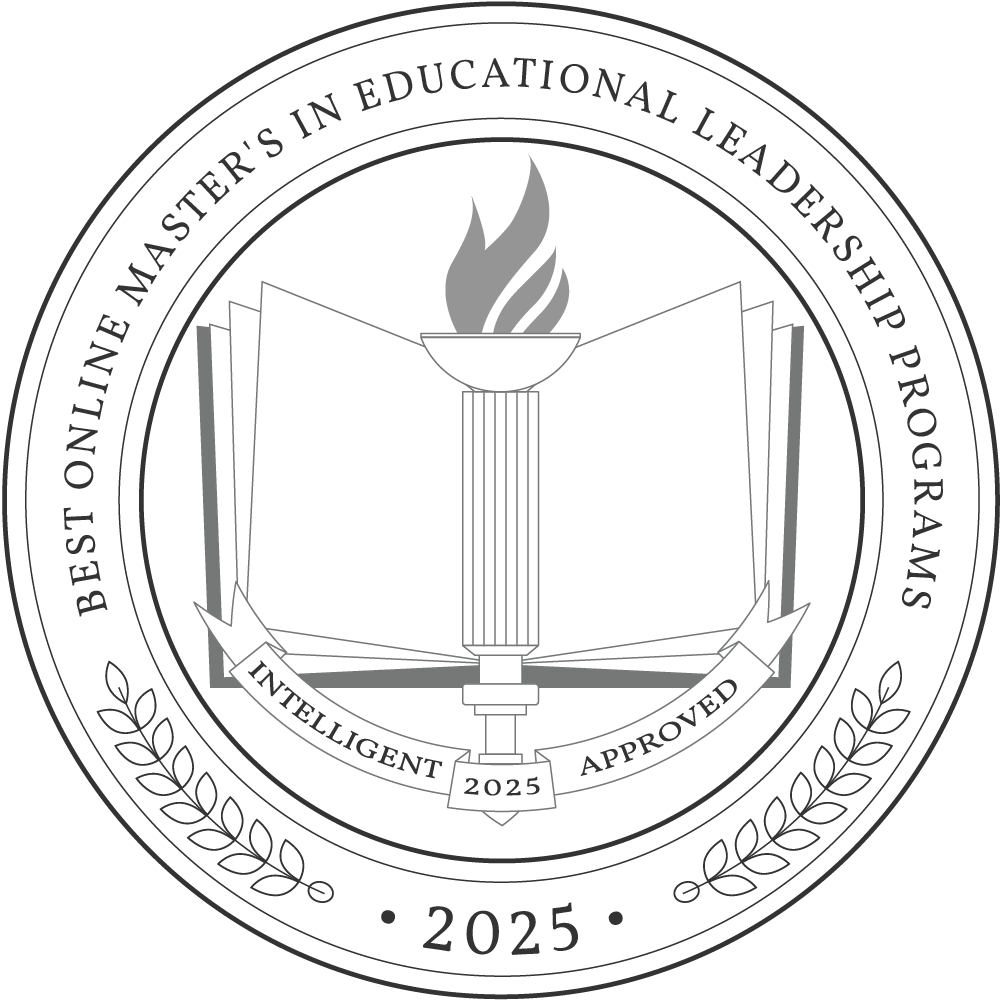Ambitious educators, driven by a commitment to improving learning environments and shaping the future of education, may find themselves drawn to a career in educational leadership as principals, superintendents, or administrators. An online master’s in educational leadership can help these individuals develop the expertise required for these critical roles.
Advancing into leadership positions can also increase the earning potential of education professionals. According to the Bureau of Labor Statistics, the median annual salary for principals is $103,460. The agency predicts that there will be approximately 20,200 new job openings per year for principals through 2032.
There are many options available to students who are considering pursuing an online master’s in educational leadership, which is why Intelligent.com compiled this list of the best degree programs for this field. This article also includes insight from Blanca Villagomez, a program coordinator and counselor at UC-Irvine, regarding how to determine which program is the right fit, what to expect from an online master’s in educational leadership, and what the career outlook is like for this field.
What Can I Expect from an Online Master’s in Educational Leadership Degree?
If you’re ready to take the next step in your educational career and make a lasting impact on students, schools, and communities, a master’s in educational leadership may be just what you need to get there. Students can choose from specialties such as school administration, curriculum and instruction, higher education leadership, educational policy, and more. These programs feature robust curriculums that focus on:
- Leadership Skills Development: The primary focus of a master’s in educational leadership program is to equip educators with the necessary leadership skills to manage educational institutions and improve student outcomes effectively. You will learn about leadership theories, decision-making, and management strategies tailored to educational settings.
- Curriculum Development: Many programs cover curriculum design and evaluation, as educational leaders often play a pivotal role in shaping their institutions’ educational content and standards.
- Policy and Administration: To understand educational policy development and administration, you will learn about legal and ethical issues in education, budgeting, and resource management.
- Instructional Improvement: Educational leaders are responsible for fostering instructional improvement. You may learn about methods for evaluating teaching effectiveness, implementing professional development programs, and using data to drive decision-making.
- Practical Experience: Some programs include internships or practicum experiences, allowing you to apply your knowledge to real education settings.
“Online programs generally offer a combination of asynchronous and synchronous modalities so expectations and pacing can vary greatly across courses,” Villagomez says. “With asynchronous courses, interactions with professors and classmates can be limited and may require more effort to stay connected. Meanwhile, synchronous courses can facilitate engagement more easily.”
Villagomez adds, “Despite the different modalities, all online degree programs require a high level of self-motivation, effective time management, and structured independent study.”
Potential courses you’ll take in an online master’s in educational leadership program
- Introduction to Educational Leadership: This course provides an introduction to the history, philosophy, and social aspects of educational leadership while reviewing relevant theories of administration, the historical role of administration in schools, and the political, social, economic, and philosophical frameworks that have informed administration.
- School Community Relations: Explores adapting educational programs to community needs, using community resources in instruction, and planning school-community relations programs.
- Public School Budgeting and Accounting: Introduces the foundation of school finance theory and investigates the concepts and practices of effective budget management.
Legal Perspectives on Education: Provides an overview of the legal framework affecting the organization and administration of public schools, including church-state issues, the rights of students and teachers, conditions of employment, teacher organizations, special education, student discipline, and more.
Why Trust Us
The Intelligent.com Higher Education Team is dedicated to providing students with independent, equitable school and program rankings and well-researched resources. Our expert-driven articles cover topics related to online colleges and programs, paying for school, and career outlooks. We use data from the U.S. Department of Education’s College Scorecard, the National Center for Education Statistics, and other reputable educational and professional organizations. Our academic advisory team reviews content and verifies accuracy throughout the year for the most current information. Partnerships do not influence rankings or editorial decisions.
- Analyzed over 2,000 national, accredited, and nonprofit colleges and universities
- 800+ rankings pages are reviewed and updated yearly
- Content is informed by reputable sources, surveys, and interviews with academic advisors and other experts
- Over 100 data points are reviewed for accuracy and quality throughout the year, including sources
How we rank schools
Our list features the best online Master’s in Educational Leadership degree programs at top colleges nationwide. Each school featured is a nonprofit, accredited institution — either public or private — with a high standard of academic quality for post-secondary institutions.
We evaluated each school’s program on tuition costs, admission, retention and graduation rates, faculty, reputation, and the student resources provided for online students. We collected data from trusted sources like the National Center for Education Statistics, individual school and program websites, school admissions counselors, and other data sources. Then, we calculated the Intelligent Score on a scale of 0 to 100 based on the following criterion:
Academic Quality:
- Admission rate versus enrollment rate
- Retention rate of students who return after year one
- Accreditation status (regional and programmatic)
- Nonprofit status, both private and public institutions
Graduation Rate
- Overall graduation rate
- Total number of currently enrolled students, including diversity metrics
- Student-to-faculty ratio
Cost and ROI
- In-state and out-of-state per-credit tuition rates and fees
- Required credits to graduate
- Earning potential after graduation
- Availability of federal student loans, scholarships, and other financial aid options
Student Resources
- Available student services for online-only and hybrid programs
- On-campus amenities like tutoring centers and the number of libraries
Read more about our ranking methodology.
Why Trust Us
The Intelligent.com Higher Education Team is dedicated to providing students with independent, equitable school and program rankings and well-researched resources. Our expert-driven articles cover topics related to online colleges and programs, paying for school, and career outlooks. We use data from the U.S. Department of Education’s College Scorecard, the National Center for Education Statistics, and other reputable educational and professional organizations. Our academic advisory team reviews content and verifies accuracy throughout the year for the most current information. Partnerships do not influence rankings or editorial decisions.
- Analyzed over 2,000 national, accredited, and nonprofit colleges and universities
- 800+ rankings pages are reviewed and updated yearly
- Content is informed by reputable sources, surveys, and interviews with academic advisors and other experts
- Over 100 data points are reviewed for accuracy and quality throughout the year, including sources
How we rank schools
Our list features the best online Master’s in Educational Leadership degree programs at top colleges nationwide. Each school featured is a nonprofit, accredited institution — either public or private — with a high standard of academic quality for post-secondary institutions.
We evaluated each school’s program on tuition costs, admission, retention and graduation rates, faculty, reputation, and the student resources provided for online students. We collected data from trusted sources like the National Center for Education Statistics, individual school and program websites, school admissions counselors, and other data sources. Then, we calculated the Intelligent Score on a scale of 0 to 100 based on the following criterion:
Academic Quality:
- Admission rate versus enrollment rate
- Retention rate of students who return after year one
- Accreditation status (regional and programmatic)
- Nonprofit status, both private and public institutions
Graduation Rate
- Overall graduation rate
- Total number of currently enrolled students, including diversity metrics
- Student-to-faculty ratio
Cost and ROI
- In-state and out-of-state per-credit tuition rates and fees
- Required credits to graduate
- Earning potential after graduation
- Availability of federal student loans, scholarships, and other financial aid options
Student Resources
- Available student services for online-only and hybrid programs
- On-campus amenities like tutoring centers and the number of libraries
Read more about our ranking methodology.
Best 38 Online Master's in Educational Leadership Degree Programs
FiltersInstitution Type
Status
- Intelligent Score
- Alphabetically By University Name
- Acceptance Rate
- Enrollment
- In-state Graduate Tuition
- Out-of-state Graduate Tuition
- In-state Undergraduate Tuition
- Out-of-state Undergraduate Tuition

Liberty University
Intelligent Score: 98.55In-state: $14,791
Out-of-state: $14,791
In-state: $7,935
Out-of-state: $7,935
SAT: 1040-1250
ACT: 21-29
$415
Online
Southern Association of Colleges and Schools Commission on Colleges
30

University of Florida
Intelligent Score: 97.01In-state: $4,477
Out-of-state: $25,694
In-state: $10,770
Out-of-state: $10,770
SAT: 1290-1460
ACT: 29-33
$734
Online
Council for the Accreditation of Education Preparation
36

UMass Global
Intelligent Score: 96.85In-state: $63,560
Out-of-state: $63,560
In-state: $55,460
Out-of-state: $55,460
SAT: Not Required
ACT: Not Required
$709
Online
California Commission on Teaching Credentialing
30

Western Governors University
Intelligent Score: 96.30In-state: $6,380
Out-of-state: $6,380
In-state: $7,500
Out-of-state: $7,500
SAT: N/A
ACT: N/A
$408
Online
Northwest Commission on Colleges and Universities
39

Mississippi College
Intelligent Score: 96.13In-state: $18,200
Out-of-state: $18,200
In-state: $11,610
Out-of-state: $11,610
SAT: 1140-1260
ACT: 21-29
$302
Online
Council for the Accreditation of Education Preparation
36

University of West Florida
Intelligent Score: 96.02In-state: $3,735
Out-of-state: $16,004
In-state: $7,088
Out-of-state: $7,088
SAT: 1060-1230
ACT: 21-27
$417
Online
Council for the Accreditation of Education Preparation
30

Florida State University
Intelligent Score: 94.75In-state: $4,640
Out-of-state: $19,084
In-state: $9,684
Out-of-state: $9,684
SAT: 1220-1350
ACT: 27-31
In-State: $444
Out-of-State: $1,076
Online
Southern Association of Colleges and Schools Commission on Colleges
33

CSP Global
Intelligent Score: 92.34In-state: $32,660
Out-of-state: $32,660
In-state: $9,090
Out-of-state: $9,090
SAT: 990-1180
ACT: 19-25
$395
Online
Higher Learning Commission
30

George Washington University
Intelligent Score: 91.92In-state: $55,961
Out-of-state: $55,961
In-state: $31,770
Out-of-state: $31,770
SAT: 1270-1450
ACT: 30-33
$1,000
Online, On-Campus, Hybrid
Council for the Accreditation of Education Preparation
30

Oklahoma State University
Intelligent Score: 89.46In-state: $5,357
Out-of-state: $20,877
In-state: $5,531
Out-of-state: $5,531
SAT: 1020-1250
ACT: 21-28
In-State: $489
Out-of-State: $530
Online
Higher Learning Commission
36

University of St. Thomas Houston
Intelligent Score: 88.74In-state: $46,348
Out-of-state: $46,348
In-state: $24,589
Out-of-state: $24,589
SAT: 1130-1340
ACT: 23-29
$598
Online
Southern Association of Colleges and Schools Commission on Colleges
30

Nova Southeastern University
Intelligent Score: 88.13In-state: $32,370
Out-of-state: $32,370
In-state: $20,618
Out-of-state: $20,618
SAT: 1030-1240
ACT: 20-27
$1,199
Online
Council for the Accreditation of Education Preparation
30

Southern New Hampshire University
Intelligent Score: 87.89In-state: $9,600
Out-of-state: $9,600
In-state: $18,810
Out-of-state: $18,810
SAT: N/A
ACT: N/A
$637
Online
New England Commission of Higher Education
36

University of Central Florida
Intelligent Score: 87.80In-state: $4,478
Out-of-state: $19,810
In-state: $6,916
Out-of-state: $6,916
SAT: 1160-1340
ACT: 25-30
In-State:$327
Out-of-State:$1,152
Online, On-Campus
Southern Association of Colleges and Schools Commission on Colleges
30

Lehigh University
Intelligent Score: 87.78In-state: $54,790
Out-of-state: $54,790
In-state: $27,000
Out-of-state: $27,000
SAT: 1260-1433
ACT: 29-33
$630
Online
Middle States Commission on Higher Education
30

Webster University
Intelligent Score: 87.50In-state: $28,500
Out-of-state: $28,500
In-state: $13,500
Out-of-state: $13,500
SAT: 1078-1260
ACT: 20-27
$752
Online, On-Campus
Council for the Accreditation of Education Preparation
30

Seton Hall University
Intelligent Score: 87.28In-state: $42,920
Out-of-state: $42,920
In-state: $24,372
Out-of-state: $24,372
SAT: 1150-1310
ACT: 25-30
$850
Online
Council for the Accreditation of Education Preparation
39

The University of Texas at Arlington
Intelligent Score: 87.03In-state: $11,448
Out-of-state: $40,032
In-state: $12,028
Out-of-state: $12,028
SAT: 1210-1470
ACT: 26-33
$1,446
Online
State Board for Educator Certification
30
How to Choose the Online Master’s in Educational Leadership Degree That’s Right for You
Step 1: Choose your area of study
“Early in the college search process, I encourage students to invest time reflecting on their academic interests, career goals, and types of learning environments they thrive in to identify the best programs for them,” Villagomez says. “A graduate program requires an investment of time, money, and energy, so it’s important for students to understand their motivations and needs before selecting a program.”
A key consideration for students interested in educational leadership is what type of degree they want to earn. Options include a Master of Education (M.Ed), a Master of Science in Education (M.S.Ed), or a Master of Arts in Education (MAE).
Students can also focus their studies on a specialization that aligns with their professional goals, such as school administration, curriculum and instruction, or higher education leadership.
When choosing your study area, it’s also essential to assess your learning preferences and lifestyle. Consider whether synchronous or asynchronous learning suits your needs and whether full-time or part-time enrollment aligns with your schedule and commitments. The right program format and scheduling can significantly impact your academic success and overall experience.
Step 2: Research schools and programs
“Researching schools and programs with a strategy can help streamline the process of finding the right program,” Villagomez says. “Students will need to develop a list of their parameters to help them narrow down their school options.”
Villagomez recommends students gather the following information by visiting the school’s website, speaking to an admissions counselor, or attending virtual information sessions:
- Application requirements
- Program curriculum and experiential learning requirements
- Cost of attendance and available financial aid
- Institution’s reputation and ranking
- Types of professional development resources offered
- Types of general support services and niche support areas offered
She also emphasizes the importance of verifying the accreditation status of the schools and programs students are considering. “Verifying the college’s accreditation ensures that the institution has the seal of approval by the U.S. Department of Education,” she says. “With institutional accreditation, colleges and universities are evaluated as a whole and must achieve several standards to receive accreditation. Programmatic accreditations evaluate the quality and legitimacy of the specific degree programs offered at institutions.”
Students should verify that their school is accredited by a recognized regional accrediting agency and that their program is accredited by the Council for the Accreditation of Educator Preparation (CAEP).
Step 3: Prepare for applications and tests
Submitting applications can be an intimidating — albeit exciting — time. Many graduate programs are competitive, so it’s essential to prepare meticulously. Allocate ample time to write an engaging application, including a standout personal statement that illustrates your enthusiasm and goals. Simultaneously, gather strong letters of recommendation from professors or employers who can attest to your abilities. Since many programs require GRE scores, consider enrolling in a test prep program to boost your scores.
Review each program’s specific requirements, deadlines, and prerequisites to ensure a robust application that makes a lasting impression on admissions committees. By preparing diligently, you’ll have a better chance of securing your spot in the program of your choice.
Step 4: Select your program
After your acceptance letters arrive, it’s time to select your program. Consider factors like specialization alignment with your career goals, financial aid opportunities, and program reputation. Revisit details like class sizes, networking opportunities, and internship possibilities.
Ultimately, choosing your program is a personal decision. Select the one that aligns with your academic needs and vision for a successful career in educational leadership.
Step 5: Determine how you’ll pay for your degree
Determining how to finance your degree is a critical step in your educational journey, as thorough financial planning can significantly impact your degree’s affordability and the return on your investment.
Seek out scholarships and grants first, as they don’t require repayment and can significantly reduce your financial burden. Individuals who are employed while earning their master’s degree can also inquire if their employer provides tuition assistance benefits to help offset educational costs.
Federal loans can help bridge gaps in funding, but be sure to borrow responsibly to avoid long-term debt. For educators, federal programs like Teacher Loan Forgiveness can provide relief after a certain number of years in the field, while Public Service Loan Forgiveness offers options for those in public education or nonprofit roles.
To be considered for federal student loans and loan forgiveness programs, as well as need-based scholarships and grants, students must apply using the Free Application for Federal Student Aid (FAFSA).
What Can I Do With an Online Master’s in Educational Leadership?
For aspiring educational administrators, a master’s in educational leadership can open up a wide range of career opportunities, including options like school principal, assistant principal, superintendent, higher education administrator, and more.
Students should note that many states require individuals in these roles to have state-level certification in order to qualify for positions. Earning your master’s in educational leadership online is an excellent way to meet this requirement. Other requirements might include classroom teaching experience, an internship or practicum in a leadership role (often including in a master’s degree curriculum), and successful completion of a licensure exam. When selecting an online master’s in educational leadership program, students should confirm that it meets the requirements of the state in which they plan to work.
A master’s in educational leadership can also build a solid foundation for further study at the doctoral level. Depending on their area of interest, students may pursue a doctorate of education (Ed.D) in areas like curriculum and instruction, educational administration, and higher education.
Career outlook
- Elementary, middle, or high school principal — Oversee school staff and operations at the K-12 level.
- Median annual salary: $103,460
- Projected employment growth (through 2032): 1%
- New job openings projected: 20,200 annually
- Postsecondary education administrator — Manage administrative functions for a university, such as admissions or recordkeeping.
- Median annual salary: $99,940
- Projected employment growth (through 2032): 4%
- New job openings projected: 15,300 annually
- Instructional coordinator — Develop, implement, and assess the effectiveness of educational materials.
- Median annual salary: $66,490
- Projected employment growth (through 2032): 2%
- New job openings projected: 19,200 annually
Online College/Degree Scholarship Database
Intelligent Scholarship Finder Tool
"A Helping Hand" Scholarship
Award Amount: $500
Due Date: January 31, 2025
"Follow Your Own Path" Essay Scholarship
Award Amount: $500
Due Date: January 31, 2025
"Tuition Solution" Scholarship for STEM Students
Award Amount: $500
Due Date: January 31, 2025
$25k "Be Bold" No-Essay Scholarship
Award Amount: $25,000
Due Date: Closed for 2024
(ISC) Graduate Cybersecurity Scholarship
Award Amount: $5,000
Due Date: Closed for 2024
(ISC) Women in Information Security Scholarship
Award Amount: $5,000
Due Date: Closed for 2024
A.C. "Kate" & Leo Joseph Merlone St. Dominic Catholic Church of Saginaw Member Scholarship
Award Amount: Varies
Due Date: Closed for 2024
A.C. "Kate" & Leo Joseph Merlone Teaching Scholarship
Award Amount: Varies
Due Date: Closed for 2024
a/e ProNet David W. Lakamp Scholarship
Award Amount: $5,000
Due Date: Closed for 2024
AAAE Native American Scholarship
Award Amount: $1,500
Due Date: March 15, 2025
Frequently Asked Questions About Online Master’s in Educational Leadership Degree Programs
Should I get a master's in educational leadership degree in person or online?
Deciding whether to pursue your master’s in educational leadership in person or online depends on your specific situation.
“Time is a non-renewable resource,” Villagomez says. “For some students, the flexibility, convenience, and accessibility of online programs provides the only viable opportunity to earn a master’s degree.”
However, online learning may not be for everyone. Students who rely on in-person interaction and hands-on instruction to facilitate learning and accountability may find that an in-person or hybrid program is a better fit.
What are the admissions requirements for an online master's in educational leadership degree?
Admissions requirements for an online master’s in educational leadership degree typically include the following:
- Bachelor’s degree from an accredited institution
- Minimum GPA, often around 3.0
- Official Transcripts
- Letters of Recommendation
- Statement of Purpose
- Resume or CV
- Standardized test scores
While many programs still require GRE or other standardized test scores, some have moved to test-optional policies. Some programs may prefer applicants with teaching experience or require an initial teacher certification.
What is the average cost of an online master's in educational leadership degree?
For the 2021-22 academic year, tuition for graduate degrees averaged $12,596 at public universities and $29,931 at private colleges. Public schools typically offer more affordable tuition than private institutions because they receive funding from the state government, reducing the financial burden for in-state students.
Online students can save money by:
- Opting for a public university
- Pursuing in-state tuition when available
- Exploring grants, scholarships, and financial aid opportunities
- Inquiring about employer tuition reimbursement programs
However, according to Villagomez, online students should budget for some expenses. “Online programs may require additional costs such as reliable internet connection and special technical software required for some classes,” she says.
How long does it take to complete an online master's in educational leadership degree?
The time it will take to complete your master’s in educational leadership will vary depending on the institution you attend and your specific course load. Some programs may offer accelerated options, resulting in faster degree completion but often requiring a more significant time commitment.
| Delivery Format | Enrollment Type | Program Duration |
| Fully Online | Full-Time | 1-2 years |
| Fully Online | Part-Time | 2-3 years |
| Accelerated Online | Full-Time | 1-1.5 years |
How hard is an online master's in educational leadership degree?
The difficulty of an online graduate degree depends on your prior education, experience, and time management skills — but it generally demands a significant commitment due to the combination of complex coursework and the need to balance studies with other obligations. Your success will largely depend on your dedication, organizational skills, and genuine passion for educational leadership.
Is an online master's in educational leadership degree worth it?
A master’s in educational leadership can be worth it for students who want to advance their careers as educational leaders. It provides the unique skill set needed to excel in positions like school principal, district superintendent, or curriculum director, often leading to increased earning potential and more significant influence in education.
From a financial perspective, investing in higher education can also be worth it. The median annual salary for instructional coordinators is $74,620, for postsecondary education administrators, $102,610, and for school principals, $103,460. By comparison, the median annual salary for K-12 teachers is $64,393.
Read More about Online Master’s in Educational Leadership Degrees
Compare School Options
Related Degrees
- Health Education
- Teaching
- Graduate Certificate in Elementary Education
- Math Education
- Educational Leadership
- Early Childhood Education
- K-12 Education
- Secondary Education
- Child Development
- Educational Administration



